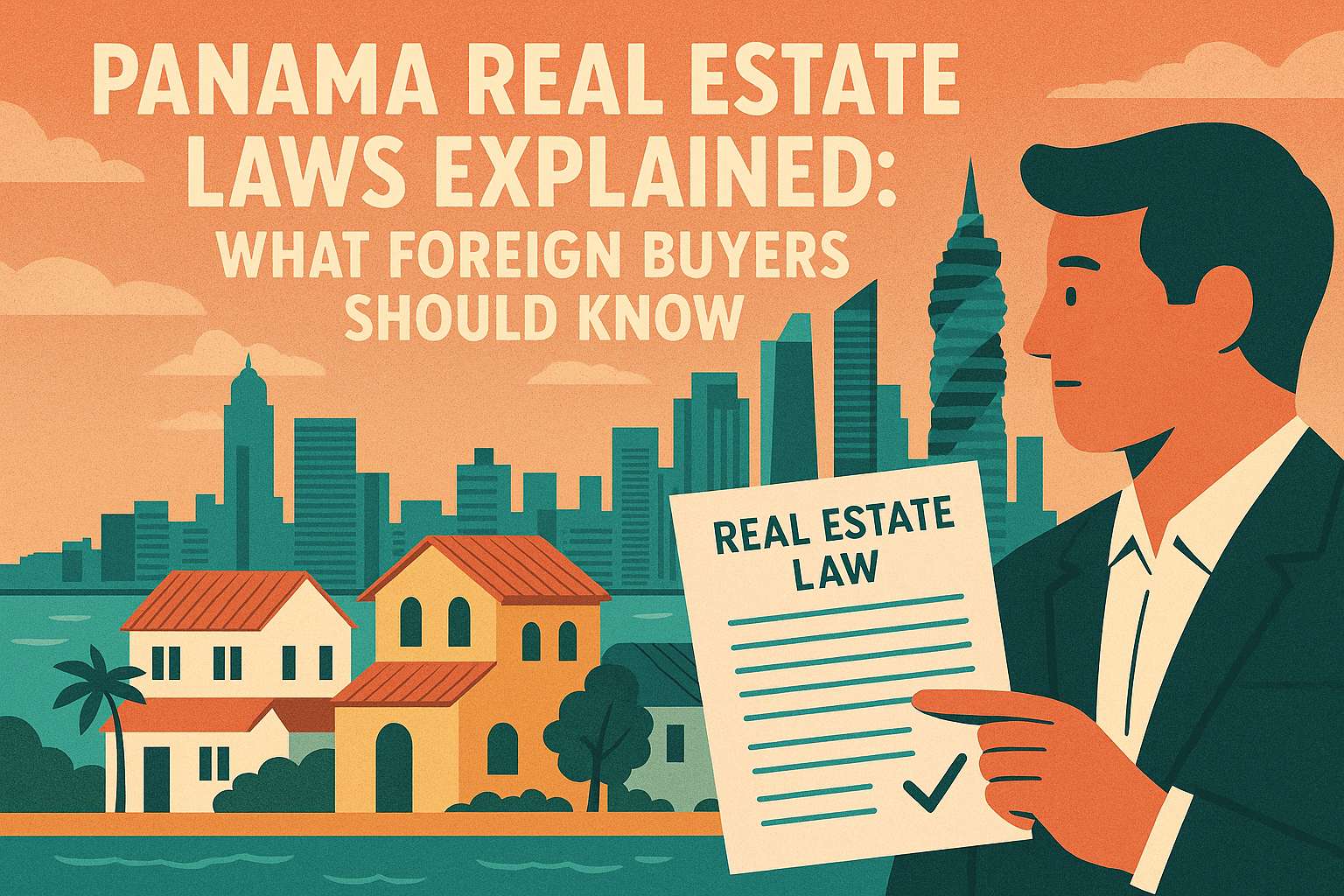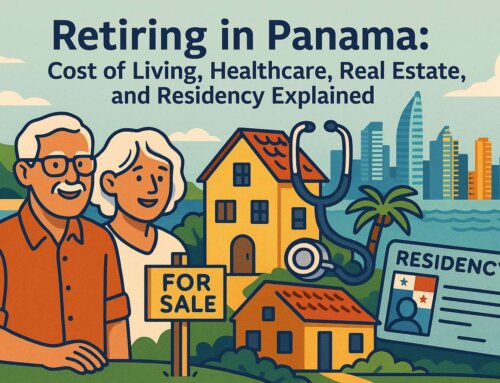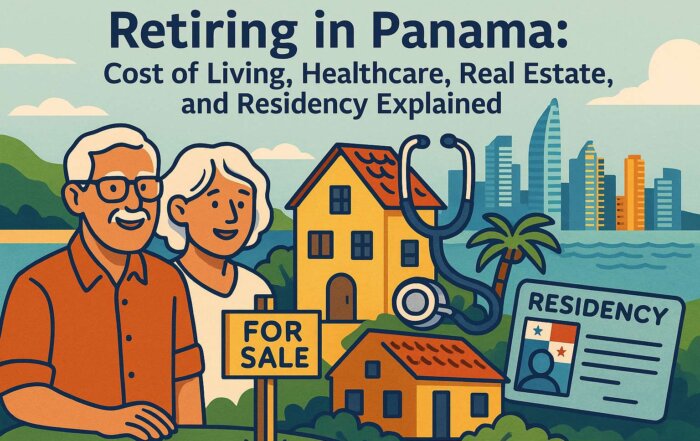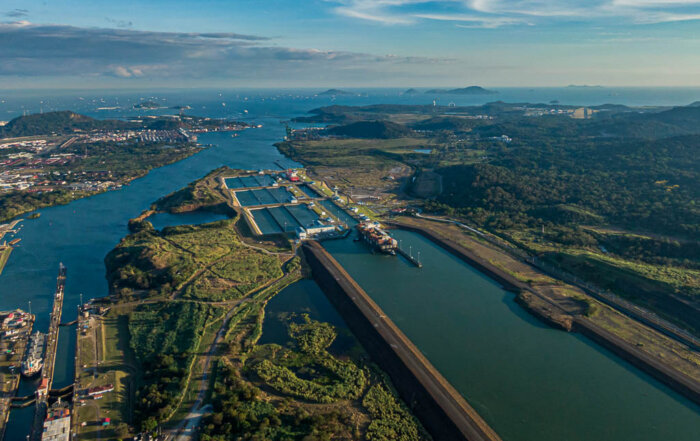
Panama Real Estate Laws Explained: What Foreign Buyers Should Know
Panama is one of the most foreigner-friendly countries in the world when it comes to property ownership. With strong legal protections, a U.S. dollar economy, and a real estate market open to non-citizens, it’s no surprise that Panama has become a top destination for international buyers.
But before investing in property, understanding Panama’s real estate laws is critical. This article breaks down the essentials — from ownership rights and title registration to restricted zones, taxes, and common legal pitfalls — so you can purchase property in Panama with confidence.
Can Foreigners Own Property in Panama?
Yes. Panama allows full property ownership rights for foreigners, with the same legal protections granted to Panamanian citizens. There is no requirement to be a resident or citizen to own real estate.
Foreign buyers can:
- Buy titled property in their own name or through a legal entity
- Own multiple properties without restrictions
- Pass on properties to heirs
- Rent out or develop property that they own
Titled vs. ROP (Right of Possession) Property
Panama has two primary types of property ownership:
Titled Property
- Registered with the Public Registry (Registro Público)
- Comes with a legally recorded deed and protected ownership
- Eligible for mortgages, resale, and full legal protection
- Most common in cities, coastal developments, and gated communities
Right of Possession (ROP)
- Not titled or registered in the National Public Registry
- Historically used in rural/coastal areas or government land concessions
- Cannot be mortgaged
- Carries higher risk and requires careful legal due diligence
Recommendation: Foreign buyers should almost always purchase titled property, unless they are comfortable with the risks associated with buying ROP.
The Role of a Public Notary and Attorney
In Panama, real estate transactions do not legally require an attorney. However, we always recommend that buyers and sellers work with a trusted attorney to protect their legal interests and ensure a smooth closing.
The attorney will:
- Conduct due diligence on the property title and confirm clear ownership
- Review legal documents, including the Promise to Purchase Agreement and final deed
- Verify that taxes, utilities, and other obligations are fully settled prior to transfer
- Guide the buyer through the closing process and registration with the Public Registry
We recommend buyers retain their own independent legal counsel rather than relying on an attorney suggested by the seller or developer.
Any real estate transaction in Panama must pass through a notary public. In practice, the notary will:
- Draft and certify the public deed (escritura pública) – the legal instrument required for transfer of ownership
- Verify identities and signatures – ensuring all parties are properly identified and authorized
- Hold documents or funds (in limited cases) – serving as a temporary custodian, though not a licensed escrow agent
Land Purchase in Restricted Areas
Foreigners can freely own titled property in most of Panama, including beachfront property. However, there are specific restrictions and exceptions that buyers should be aware of:
- Border Zones: Properties located within 10 kilometers of an international border (e.g., Costa Rica or Colombia) are restricted. Foreigners generally cannot acquire titled property in these areas.
- Indigenous Territories (Comarcas): Land within the autonomous indigenous regions is collectively owned and cannot be sold or titled to foreigners.
- Certain Islands: Some offshore islands have land held under Right of Possession (ROP) rather than full title. While many prime islands — such as Isla Contadora in the Pearl Islands — do have titled land available, many others remain primarily ROP or require special concessions.
Key Point: Many popular investment destinations — including Panama City, Boquete, Coronado, Pedasí, and Playa Venao — are outside these restricted zones and offer titled property with the same rights as Panamanian citizens. That said, ROP land still exists throughout Panama, even in popular areas, so it is essential to confirm the ownership status of a property early in the conversation and proceed with due diligence.
Property Ownership Structures for Foreigners
Foreigners have several ways to hold property, each with its own implications for taxation, inheritance, and compliance:
In Your Own Name
- Title is registered directly to the buyer in the Public Registry. Straightforward to set up, but property must go through Panamanian probate on death, which can delay inheritance. Provides full legal protection, but limited succession planning options.
Corporation (Sociedad Anónima, S.A.)
- A Panamanian company holds the property, and the buyer owns shares in the corporation. This structure is widely used for rentals, multiple properties, or joint ownership. Bypasses probate because shares can be transferred to heirs without re-titling. Offers separation between the asset and the individual but requires annual taxes, a resident agent, and corporate compliance.
Private Interest Foundation (Fundación de Interés Privado, FIP)
- Designed for estate planning and inheritance. Property is held by the foundation, with beneficiaries named in its charter. Avoids probate and ensures direct transfer of assets. Can also own shares in an S.A. for layered protection. Requires annual fees and careful structuring to comply with local and international tax rules.
Each option has different succession, tax, and maintenance consequences. Holding title personally may work for a simple purchase, but corporations and foundations provide protections and planning advantages. Always consult a Panamanian attorney to decide the right structure.
Taxes & Fees When Buying Property in Panama
Property Tax
- Primary Residence (Vivienda Principal):
- 0% on the first $120,000 of assessed value.
- 0.5% on the portion between $120,001–$700,000.
- 0.7% on the portion above $700,000.
- Secondary or Investment Properties:
- 0% on the first $30,000.
- 0.6% on the portion between $30,001–$250,000.
- 0.8% on the portion between $250,001–$500,000.
- 1.0% on the portion above $500,000.
Important Notes
- Panama previously offered long-term (up to 20 years) tax exemptions on new construction. These were eliminated in 2019, though grandfathered properties still benefit if the exemption was granted before the law changed. Newer developments do not enjoy the same exemptions.
- Today, buyers should assume property tax applies and only rely on exemptions if verified through the official resolution granting the exemption.
Title Insurance & Due Diligence
Panama has a well-defined legal framework for property ownership, but buyers should always carry out thorough due diligence:
- Verify Clean Title: Ensure the property is correctly registered in the Public Registry and free of liens, mortgages, overlapping claims, or disputes.
- Confirm Land Use / Zoning: Zoning regulations apply nationwide. However, in rural areas it is common for land to have no specific zoning designation until a development plan is proposed. This means permitted uses may be undefined at the time of purchase, and clarification should be sought with municipal authorities.
- Check for Debts and Obligations: Confirm that property taxes, municipal charges, utilities, and condominium/HOA fees (if relevant) are up to date, as unpaid balances can carry over to the new owner.
- Properly Document Transactions: All agreements and payments should be handled through formal contracts and reviewed by your attorney.
Note on Title Insurance: Title insurance is not standard in Panama. Instead, the Public Registry system itself serves as the assurance of ownership. Legal due diligence by an independent Panamanian attorney is the primary safeguard for buyers.
Can Foreigners Get a Mortgage in Panama?
Yes, mortgage financing is possible for foreigners in Panama — but it is not common and approval standards are strict.
General Bank Requirements:
- Panamanian residency or citizenship is preferred (though not always mandatory).
- Down payments typically range from 20%–50% of the purchase price.
- Proof of stable income and a banking history acceptable to the lending institution.
Documents Banks Commonly Require for Pre-Approval:
- Passport (copy)
- Driver’s license
- Most recent tax return or other proof of income
- Last 12 months of bank statements
- Bank reference letter
- Signed purchase contract or proforma (if a contract has not yet been signed)
- Complete credit report, not a summary
Additional Documents Depending on Profile:
- If you own a company: two business references + basic company information.
- If employed: employment letter + W2 tax form (or local equivalent).
- If you have Panamanian residency or an immigration process in progress: copy of residency/immigration documents.
Panama’s banks are conservative lenders, and foreign buyers without local residency or income may find financing approval difficult.
Because of these hurdles, many foreign buyers choose to pay in cash or secure financing from their home country, especially for pre-construction projects where developers already offer structured installment payment plans.
Rental Laws & Income Tax for Foreign Owners
In Panama, rental laws tend to favor renters, so clear contracts are key.
- Lease Registration: All leases should be registered with MIVIOT, which holds the security deposit. In practice, this isn’t always done—confirm with your realtor or attorney.
- Short-Term Rentals: In Panama City, rentals under 45 days (Airbnb-style) are prohibited unless the building has a special tourism permit. In other areas, short-term rentals are generally allowed but may be restricted by condo or municipal rules.
If you do not live in Panama full-time, it’s wise to hire a property manager and establish a legal structure to receive income securely.
What Every Foreign Buyer Should Know
Have questions??? Contact us at Panama Sovereign Realty.







